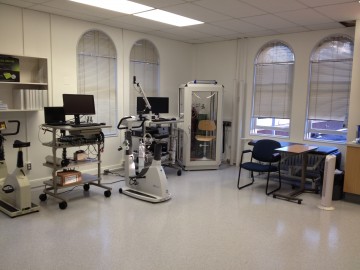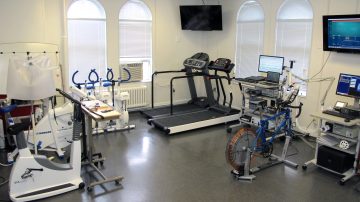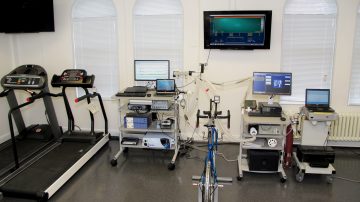


The primary aim of the Cardiopulmonary Exercise Physiology Laboratory is to better understand the physiological factors that limit exercise tolerance across the spectrum of health and chronic lung disease. The lab uses a number of novel measurement techniques to simultaneously assess the respiratory, cardiovascular, muscular and neuro-physiological responses to exercise. The long term goal of this research program is to develop more effective rehabilitation interventions to improve exercise performance and quality of life for those suffering from chronic lung diseases.
The Cardiopulmonary Exercise Physiology Laboratory is part of the Centre for Heart Lung Innovation, UBC and St. Paul’s Hospital and is located in St. Paul’s Hospital on the fourth floor of the Burrard Building. The lab is equipped with:
- Parvo Medics TruOne 2400 metabolic system for maximal oxygen consumption testing and indirect calorimetry assessment
- Two Vmax metabolic systems for assessing cardiopulmonary responses to exercise
- Body plethysmograph for detailed assessment of pulmonary function
- Two electronically braked cycle ergometers and two treadmills with metabolic system integration capabilities
- Velotron cycle ergometer
- Five Monark stationary cycle ergometers for exercise rehabilitation training
- 12-lead electrocardiogram
- Multi-pair electrode catheters combining two balloons for measuring diaphragmatic electromyography and respiratory mechanics
- Two diaphragmatic electromyography measurement systems
- Pressure transducers for assessing respiratory pressures
- Wireless surface electromyography for assessing peripheral skeletal muscle activity
- Magnetic stimulator for assessing respiratory and locomotor muscle fatigue
- Two four-channel continuous-wave near-infrared spectroscopes to measure tissue oxygenation and blood flow
- Two PowerLab data acquisition systems